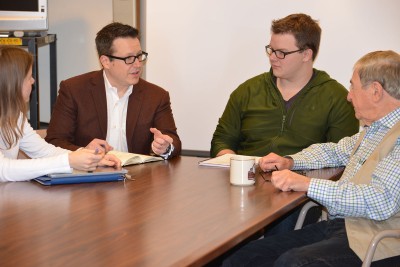
Professors Joseph Renzulli and Ronald Beghetto of the Neag School of Education have been awarded a $175,000 grant from the Imagination Institute at the University of Pennsylvania.
The grant will fund their research into creativity, imagination, and innovation as vital outcomes of schooling, and will include the development of a new series of validated instruments, a portfolio that documents schools’ outcomes, and a guidebook for schools to develop and extend their imagination, creativity, and innovation (ICI) resources. Once implemented, the researchers’ School Imagination, Creativity, and Innovation Index and Portfolio would be the first ICI instrument and formative evaluation process to exist in American schools.
According to Renzulli and Beghetto, both researchers at the University of Connecticut’s Neag Center for Creativity, Gifted Education and Talent Development, many schools may be overlooking opportunities to develop students’ skills in the area of ICI – skills the researchers deem essential to the nation’s future economic and cultural prosperity. Ultimately, the School ICI Index and Portfolio is intended to give educators the tools they need to infuse ICI activities into academics – and, in turn, develop more imaginative graduates, who are in increasingly high demand in today’s society.
“In the modern global economy, industry leaders are increasingly looking for personnel with skills in imagination, creativity, and innovation,” says co-principal investigator Renzulli. “Educational leaders in the United States and around the world have put an emphasis on creativity and are looking for ways to assess its promotion in schools.”
The first stage of the research project will include collecting data from more than 400 schools. From there, the ICI instrument “will be developed and validated with input from experts and practitioners over two years,” Beghetto says. “The guidebook and accompanying opportunities for professional development associated with this project will emphasize leadership, services, resources, and ongoing assessment designed to change the entire culture of a school.”
Additionally, the researchers plan to establish a summer institute in which district leaders converge to learn how to build an ICI culture within their school systems.
Renzulli and Beghetto’s proposal was one of 16 selected for funding by UPenn’s Positive Psychology Center. UPenn chose proposals that would examine and measure imagination and creativity in innovative ways.
A small but growing number of states are paving the way in developing creative opportunities for students. For instance, although leaders in Massachusetts, Oklahoma, and California are working toward evaluating schools statewide in their effectiveness in developing and assessing ICI among K-12 students, “research-based instruments and procedures have not yet been developed,” Renzulli says. The School ICI Index and Portfolio will therefore be “designed to assess and provide guidance for promoting ICI in schools and are based on a fundamental premise: That which is evaluated gets done.”
“Large numbers of young people are clearly capable of developing ICI skills, but it will not happen without a concerted effort and specific reward system that nurtures these talents,” Renzulli and Beghetto state in their research proposal. “Schools that place a premium on developing these potentials may be those that are most likely to prepare students that one day develop miraculous cures for disease, launch new businesses, … invent technological marvels, and contribute to the arts, sciences, and humanities in ways that will improve efficiency, effectiveness, aesthetics, and the quality of life for countless generations to come.”
 Facebook
Facebook
 Twitter
Twitter
 LinkedIn
LinkedIn
